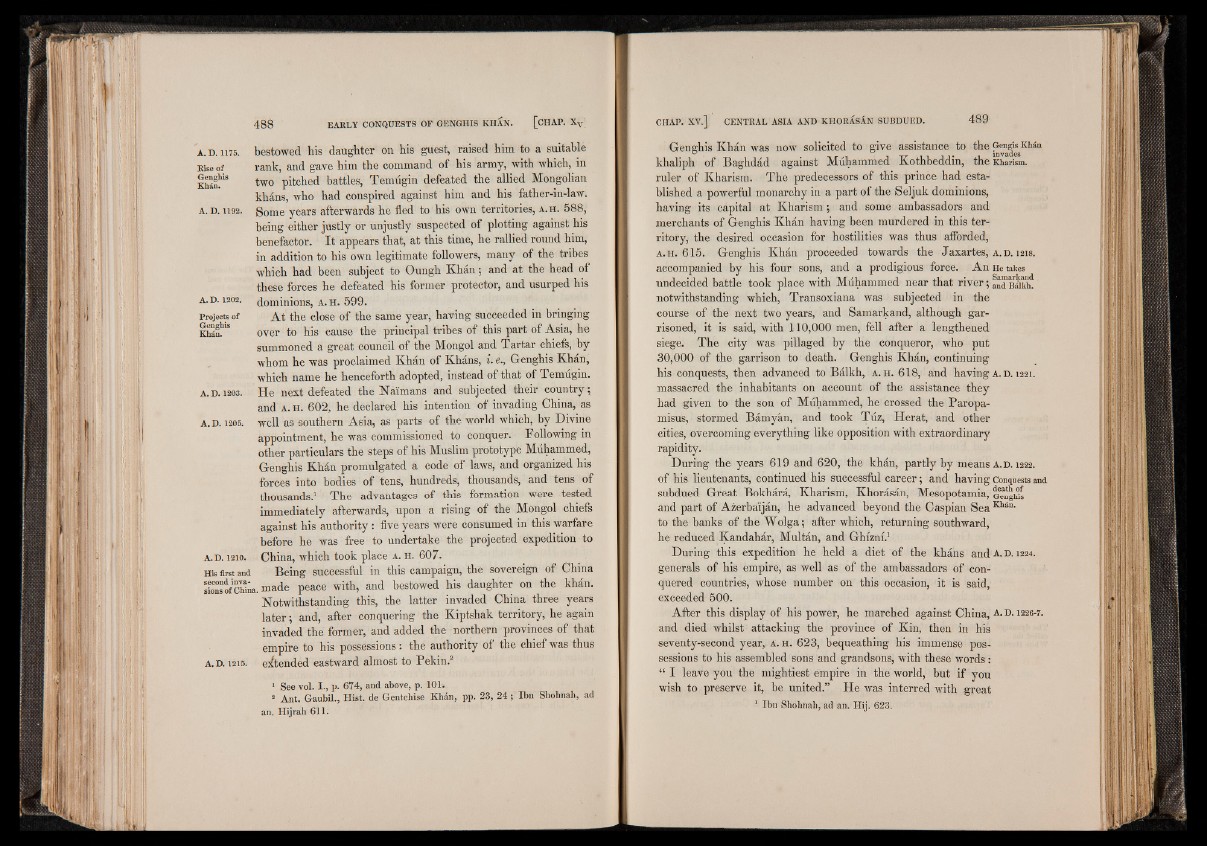
A. d . 1 1 7 5 . bestowed, his daughter on his guest, raised him to a suitable
Rise O f rank, and gave him the command of his army, with which, in
K bit* two pitched battles, Temugin defeated the allied Mongolian
khans, who had conspired against him and his father-in-law.
A. d . 1192. Some years afterwards he fled to his own territories, a . h . 588,
being either justly or unjustly suspected of plotting against his
benefactor. It appears that, at this time, he rallied round him,
in addition to his own legitimate followers, many of the tribes
which had been subject to Oungh Khan; and at the head of
these forces he defeated his former protector, and usurped his
A.D . 1202. dominions, a . h . 599.
Projects o f At the close of the same year, having succeeded in bringing
KMn!*18 over to his cause the principal tribes of this part of Asia, he
summoned a great council of the Mongol and Tartar chiefs, by
whom he was proclaimed Khan of Khans, i. e., Genghis Khan,
which name he henceforth adopted, instead of that of Temugin.
A .D . 1203 . He next defeated the Kaimans and subjected their country;
and a . h . 6 0 2 , he declared his intention of invading China, as
a . d . 12 0 5 . well as southern Asia, as parts of the world which, by Divine
appointment, he was commissioned to conquer. Following in
other particulars the steps of his Muslim prototype Muhammed,
Genghis Khan promulgated a code of laws, and organized his
forces into bodies of tens, hundreds, thousands, and tens of
thousands.1 The advantages of this formation were tested
immediately afterwards, upon a rising of the Mongol chiefs
against his authority: five years were consumed in this warfare
before he was free to undertake the projected expedition to
a . d . 1 2 10 . China, which took place a . h . 6 0 7 .
His first and Being successful in this campaign, the sovereign of China
sionsofCMna. made peace with, and bestowed his daughter on the khan.
Notwithstanding this, the latter invaded China three years
later; and, after conquering the Kiptshak territory, he again
invaded the former, and added the northern provinces of that
empire to his possessions ’ the authority of the chief was thus
a.d. i2i5. extended eastward almost to Pekin.2
1 See vol. I., p. 674, and above, p. 10H
8 Ant. Gaubil., Hist, de Gentchise Khan, pp. 23, 24 ; Ibn Shohnah, ad
an. Hijrah 611.
Genghis Khan was now solicited to give assistance to the
khaliph of Baghdad against Muhammed Kothbeddin, the Kharism.
ruler of Kharism. The predecessors of this prince had established
a powerful monarchy in a part of the Seljuk dominions,
having its capital at Kharism; and some ambassadors and
merchants of Genghis Khan having been murdered in this territory,
the desired occasion for hostilities was thus afforded,
a . h . 615. Genghis Khan proceeded towards the Jaxartes, a . d . 1218.
accompanied by his four sons, and a prodigious force. An He takes
undecided battle took place with Muhammed near that river; and Bakin
notwithstanding which, Transoxiana was subjected in the
course of the next two years, and Samarkand, although garrisoned,
it is said, with 110,000 men, fell after a lengthened
siege. The city was pillaged by the conqueror, who put
30,000 of the garrison to death. Genghis Khan, continuing
his conquests, then advanced to Balkh, a . h . 618, and having a . d. 1221.
massacred the inhabitants on account of the assistance they
had given to the son of Muhammed, he crossed the Paropa-
misus, stormed Bamyan, and took Tuz, Herat, and other
cities, overcoming everything like opposition with extraordinary
rapidity.
During the years 619 and 620, the khan, partly by means a . d . 1 2 2 2 .
of his lieutenants, continued his successful career; and having Conquests and
subdued Great Bokhara, Kharism, Khorasan, Mesopotamia, Genghis
and part of Azerbaijan, he advanced beyond the Caspian Sea Khto-
to the banks of the Wolga; after which, returning southward,
he reduced Kandahar, Multan, and Ghizni.1
During this expedition he held a diet of the khans a n d A. d . 12 2 4 .
generals of his empire, as well as of the ambassadors of conquered
countries, whose number on this occasion, it is said,
exceeded 500.
After this display of his power, he marched against China, A-D-1226-7.
and died whilst attacking the province of Kin, then in his
seventy-second year, a . h . 623, bequeathing his immense possessions
to his assembled sons and grandsons, with these words:
“ I leave you the mightiest empire in the world, but if you
wish to preserve it, be united.” He was interred with great
1 Ibn Shohnah, ad an. Hij. 623.